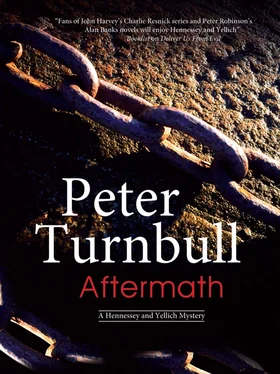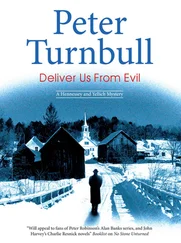Peter Turnbull - Aftermath
Здесь есть возможность читать онлайн «Peter Turnbull - Aftermath» весь текст электронной книги совершенно бесплатно (целиком полную версию без сокращений). В некоторых случаях можно слушать аудио, скачать через торрент в формате fb2 и присутствует краткое содержание. Жанр: Полицейский детектив, на английском языке. Описание произведения, (предисловие) а так же отзывы посетителей доступны на портале библиотеки ЛибКат.
- Название:Aftermath
- Автор:
- Жанр:
- Год:неизвестен
- ISBN:нет данных
- Рейтинг книги:4 / 5. Голосов: 1
-
Избранное:Добавить в избранное
- Отзывы:
-
Ваша оценка:
- 80
- 1
- 2
- 3
- 4
- 5
Aftermath: краткое содержание, описание и аннотация
Предлагаем к чтению аннотацию, описание, краткое содержание или предисловие (зависит от того, что написал сам автор книги «Aftermath»). Если вы не нашли необходимую информацию о книге — напишите в комментариях, мы постараемся отыскать её.
Aftermath — читать онлайн бесплатно полную книгу (весь текст) целиком
Ниже представлен текст книги, разбитый по страницам. Система сохранения места последней прочитанной страницы, позволяет с удобством читать онлайн бесплатно книгу «Aftermath», без необходимости каждый раз заново искать на чём Вы остановились. Поставьте закладку, и сможете в любой момент перейти на страницу, на которой закончили чтение.
Интервал:
Закладка:
The attic of Bromyards he found to be as he had expected it to be; a disorganized receptacle for assorted items not required in the living area of the house and which were sufficiently small to be able to be lifted through the trap door, being its sole point of ingress and egress. He saw also that a lot of detritus had accumulated since 1719. The detritus in the attic had not, he noticed with a groan of dismay, been covered with dust sheets. He dare not proceed further into the cobwebs and the dust without extra thick coveralls. He also saw that he would need a base upon which to stand, there being no proper flooring in the attic, just beams going across the width of the house with thin plaster, which would not take his weight between them. That, though, he reasoned, is what recces are all about. It is the purpose of a recce, to determine what is where and also what is going to be needed. He carefully descended from the attic and returned to the ground floor of the house and searched and found the entrance to the cellar. In the cellar he, for some reason, felt particularly vulnerable. As he swept the room with the beam of his torch he saw that the contents of the cellar seemed to be similar to that of the attic, unwanted items which were perhaps larger and heavier than the ones which had been lifted into the attic. The cellar, accessed by a flight of stone steps, had been built in a pattern of ten chambers and had an earthen floor, which Seers felt was highly unusual for the Vale of York and its low-lying nature, which rendered it prone to flooding. Bromyards, he assumed, must occupy an island of high ground which thusly permitted the excavation of a cellar over which the house was then built.
John Seers emerged from the cellar and left the house by the large front door and began his exploration of the garden and the grounds beyond. Outside he felt uncomfortably warm in his coveralls and kept his eyes downcast to shield them from the glare of the sun, which by mid forenoon was already high in the sky. He found he felt safer in the garden and so reasoned that the fear he had experienced in the house must have been generated by the gloom and the restricted vision of seeing nothing beyond whichever room or corridor he was in at any one time, and yet knowing he was within a very large and unoccupied house. Yet, once in the garden he could survey a greater area illuminated by sunlight and so would have earlier warning of the approach of any threat. Despite this, he still felt comforted and re-assured by the axe helve he continued to hold.
He probed his way through the grass which had grown to waist height in places and heard the scurrying of rodents within the grass as they timidly ran at his approach. The grounds were massively overgrown with grasses dominating the vegetation. Although Seers was able to make out parts of the garden, the border of a lawn, the row of oak trees, the apple orchard with the boughs sagging under the great weight of fruit, he could not exactly say where the garden had ended and the wilderness of the grounds began.
Remaining near the house, he found that the outbuildings were of a solid wooden construction and it seemed, like the house, that they appeared to be still in a structurally sound condition. They had clearly been very well maintained and it looked as if the last person to have had responsibility for them had applied a generous seal of weatherproofing to the buildings in anticipation of them being abandoned. Within the buildings were garden tools of an earlier era, solid and heavy and still functional, although an ancient lawnmower had become badly corroded and Seers guessed it was worth only scrap value. The garage amid the buildings contained a Talbot of 1930s’ vintage which had been left resting on wooden blocks so as to preserve the suspension as much as possible, and when Seers opened the driver’s door he found that the interior of the car smelled richly of leather and he experienced a they-don’t-make-’em-like-this-anymore moment. Seers knew little about cars but he sensed that the Talbot could be restored and that it was an item of high value. Leaving the garage, he waded through waist-high grass to a gazebo, the paint of which had peeled over many summers. He ventured towards the structure and found that it seemed solid and immovable. Clearly it had settled and set upon the mechanism on which it had once been rotated in accordance with the movement of the sun across the sky. Unlike the other outbuildings, the gazebo would, so Seers thought, be earmarked for demolition. Brushing a persistent fly from his face Seers turned to the kitchen garden. It was the only part of the property mentioned in the schedule that he had not yet visited. He thought a glance at the kitchen garden and then the overview of Bromyards would be complete and thus a good morning’s work be achieved. He would lunch in the village and then return to commence work proper that afternoon.
The kitchen garden was, he discovered, an area of approximately one hundred yards by fifty yards, and was bordered, or enclosed, by a brick wall of some ten feet in height and which had been painted white, as he was to find, on both the interior and the exterior surfaces, with the topmost line of bricks painted black. As had only to be expected, the paint had faded and peeled on the south-facing walls and on the topmost bricks. Access to the kitchen garden was by a single green painted wooden door set, curiously Seers thought, in the section of the wall which was furthest from the house, needlessly extending the walk between the kitchen garden to the kitchen itself. He followed the overgrown path, which led from the house to the kitchen garden with the northern facing wall of the garden to his right. He turned at the end of the wall and stood in front of the door. To his dismay he saw that the door was lockable and he envisaged having to break down the door, leaving the new owners, whoever they may be, to build a replacement.
The door, in the event, had not been locked and the key then placed on one side, unlabelled. To Seer’s surprise it not only opened but it swung open easily, moving silently on its hinges, and at that instant John Seers was stabbed with a sense of real fear, not the fear of the unknown that he had felt in the house, not the fearing of fear itself, not the fear which had largely evaporated upon his leaving the house and stepping out of doors into the sun-drenched garden, but this was fear created by observation, and by logical deduction caused by common sense, or what his cloth-cap wearing coal-mining grandfather would have called ‘gumption’. Unlike all the other doors in Bromyards, except for the bedroom of the last occupant, which protested when opened because their hinges had seized from under use, the door of the kitchen garden opened noiselessly on lubricated hinges. ‘Gumption’ told him that the door had been frequently and recently used. As the old man had been lying dying in a small room in his huge house, someone, or some persons had been accessing the kitchen garden for purpose or purposes unknown, although the lubricated hinges were testament to the fact that he or she, or they, wished their activity to remain undetected. A house full of valuables, and so easily removed, yet someone was interested only in the kitchen garden? John Seers knew fear and, cautiously, he pushed the door open.
He did not notice the bodies at first. The first thing he saw was the ivy clad surfaces of the walls. Also ivy covered was a large greenhouse still with, so far as he could tell, all panes of glass still intact. All the hinged panes were closed and Seers knew that that would make the interior of the greenhouse insufferably hot within, he would have to open the windows to allow the structure to ‘breathe’ and then return some time later. The remainder of the kitchen garden was extensively overgrown and once again grasses had come to dominate the vegetable patches. It was when he once again noticed how aggressive grass becomes when an area of land is left unattended that the skull grinned at him. He stood, startled for an instant, and then he felt that the skull, human, bleached by the sun and inclined in his direction was not grinning but was somehow saying, ‘Help me, help me’, and beyond the first skull was a second, also human, and beyond that a third. John Seers did not look any further but turned, slowly, and walked back to what he felt to be the safety of his car, and there he took his mobile from his pocket and pressed three nines and told the officer what he had found. ‘Directions?’ he replied to the next query. ‘Oh, you’ll never find it,’ he glanced at the road map he had followed earlier that morning, ‘drive on the road between Leavening and Thixendale. . don’t know its number, it’s not given on this map. I’ll wait on the road and make myself known to the attending officer. Tell him to look for a bloke in white coveralls standing by a red Vauxhall.’
Читать дальшеИнтервал:
Закладка:
Похожие книги на «Aftermath»
Представляем Вашему вниманию похожие книги на «Aftermath» списком для выбора. Мы отобрали схожую по названию и смыслу литературу в надежде предоставить читателям больше вариантов отыскать новые, интересные, ещё непрочитанные произведения.
Обсуждение, отзывы о книге «Aftermath» и просто собственные мнения читателей. Оставьте ваши комментарии, напишите, что Вы думаете о произведении, его смысле или главных героях. Укажите что конкретно понравилось, а что нет, и почему Вы так считаете.












